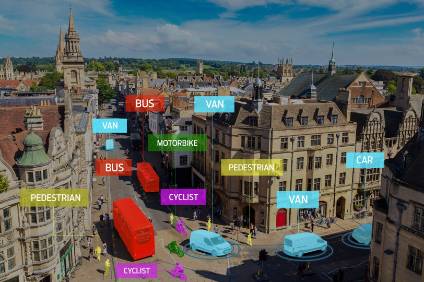
Ford is developing a digital road safety tool that it says could predict potential incident hotspots, using data from sources including connected vehicles and roadside sensors.
Ford is partnering with Vivacity Labs, Oxfordshire County Council and Loughborough University with support from Transport for London following funding from the British government innovation agency, Innovate UK, and the UK Department of Business, Energy and Industrial Strategy.

Discover B2B Marketing That Performs
Combine business intelligence and editorial excellence to reach engaged professionals across 36 leading media platforms.
The initiative follows extensive Ford research into how advanced analytics and data from connected vehicles can be used to improve urban mobility and road safety. This identified how relatively minor improvements could potentially address issues.
The ‘Data-Driven Road Safety Tool’ will analyse information from connected vehicles, smart roadside sensors and local-authority data to predict the likely locations and possible root causes of potential road safety hotspots. The insights will enable cities to take pre-emptive action to address roads and junctions that pose the highest risks to road users.
“Soon every new vehicle will be a connected vehicle, and we see this as an opportunity to reduce road traffic incidents and save lives in a significant way,” said Jon Scott, project lead, City Insights, Ford Mobility, Europe. “By collaborating with leading innovators, experts and academics – and with the backing of Innovate U.K.– we truly believe we can help improve mobility for millions around the world.”
Detailed telematics data from the fleet of vehicles – such as brake or accelerator pedal usage and steering wheel angle – will be analysed alongside information from up to 25 additional smart sensors to be provided in Oxfordshire by Vivacity Labs a specialist in traffic capture and classification, bringing the total number in use up to 100.
Experts from the Transport Safety Research Centre at Loughborough University, led by Ruth Welsh, senior lecturer, Traffic Safety and Ford’s Global Data Insight and Analytics team will analyse driver and vehicle data, while Oxfordshire County Council will focus on how local authority-provided data sources combined with the predictive tool can improve road safety for all users.
“Oxfordshire County Council is committed to enabling innovative applications for connected vehicle technology that will benefit our communities,” said Llewelyn Morgan, head of innovation, Oxfordshire County Council. “By connecting vehicle data with smart infrastructure, we hope this project will help improve safety for all road users.”
The insights and analysis will be used to further prove and develop the digital road safety algorithm and tool into a scalable, commercial product to benefit cities and citizens around the world. The consortium will also seek to uncover further real-world applications for predictive road safety-related insights.
“Loughborough has a unique capability in Transport Safety research, built up over almost 40 years, and we are proud to be part of a transformational project to position the UK as a global leader in connected vehicle safety,” said Prof Steve Rothberg, pro vice-chancellor for research), Loughborough University.






